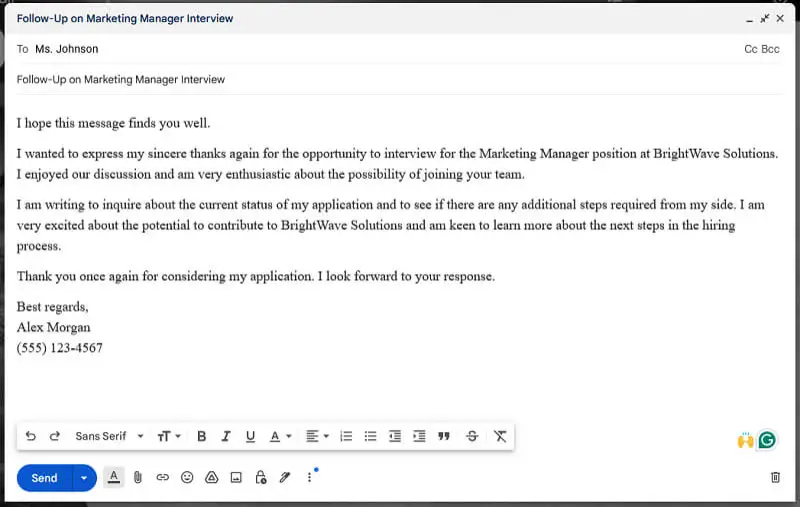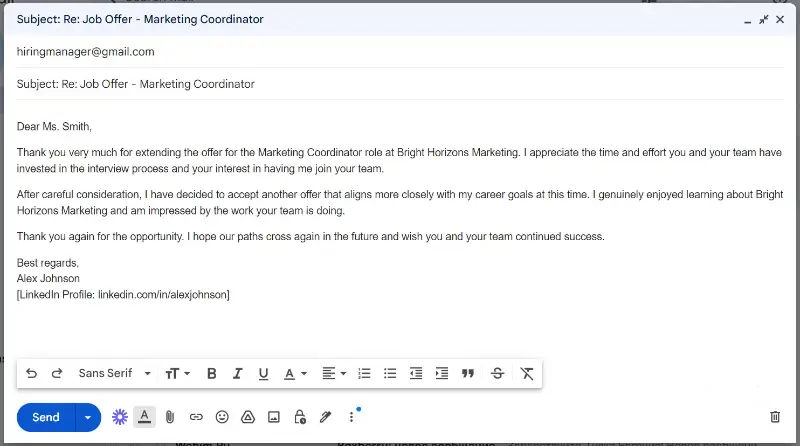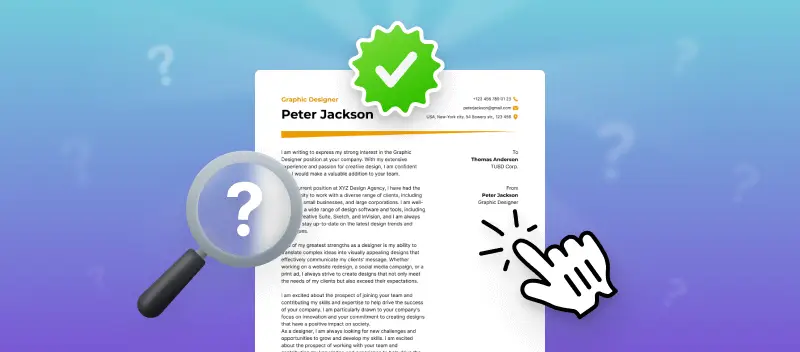Navigating the job application process can be a nerve-wracking experience, especially as you await the final decision from potential employers.
One of the most pressing interview questions that might be on your mind is how to know if you got the job. Understanding the signals that indicate whether you've been selected for the position can help alleviate some of the uncertainty.
In this article, we will explore various clues that may mean you've successfully landed the job.
Signs you will get the job after an interview
It's natural to be eager for feedback from the HR and signs they will hire you. While there's no surefire way to predict the outcome, several hints can suggest you’re a strong candidate.
Below are some key indicators that can help you answer the question "Did I get the job?"
1. Body language
If the recruiter displays a favorable attitude, it’s often a good sign that they’re receptive to your responses.
How to tell if you got the job:
- Consistent eye contact shows that the interviewer is paying attention and is interested in what you have to say.
- A genuine smile suggests a friendly attitude .
- When the hiring manager nods while you speak, it means that they are agreeing with or appreciating your responses.
- Positive, animated gestures and facial expressions can indicate that the HR is engaged.
You describe how you handled a difficult client, and the interviewer nods approvingly.
2. Detailed discussions
When an interviewer takes the time to explain the specifics of the role, including day-to-day tasks, long-term projects, and key responsibilities, it often indicates that they are envisioning you in that role.
Talking about how the position integrates into the team or involves interactions with other departments also entails an assessment of how well you would work together.
The manager outlines your expected daily workflow, explaining how you would collaborate with the marketing and product teams on upcoming campaigns.
3. Talk of next steps
This conversation typically involves outlining what comes after the interview, such as additional rounds, assessments, or timelines for making a final decision. It’s one of the good interview signs you got the job.
For instance, if the hiring manager mentions scheduling a second interview, it suggests that they are interested in further evaluating your fit for the occupation.
Moreover, talking about next steps often reflects that the interviewer is invested in keeping you informed and engaged in the process. It shows that they see potential in you and want to ensure that you know what to expect as the process progresses.
The recruiter provides a timeline, saying they expect to make a decision within two weeks and will keep you updated.
4. Inquiries about your availability
This line of questioning often signifies that the employer is beginning to think about the logistics of bringing you on board.
Inquiries might include questions about:
- When you can start and if you want to work remote or in person
- How soon you can transition from your current job
- Your flexibility regarding start dates
Such questions typically arise when the recruiter is assessing how soon they could expect you to begin if you got the job offer. They may also be exploring any potential conflicts with your current obligations or gauging your readiness to move forward.
Would you be able to start immediately if needed, or would you require a notice period?
5. Feedback
Positive feedback can come in various forms, including verbal affirmations, enthusiastic replies, or expressions of admiration about your resume.
It's a good sign that you probably got the job if the interviewer:
- Highlights specific strengths you've demonstrated
- Comments on how well your experience matches the job requirements
Moreover, enthusiastic phrases about how your skills could contribute to the company’s work goals reflect their interest in recruiting you.
Your background in project management aligns perfectly with what we’re looking for.
Create your professional Resume in 10 minutes for FREE
Build My Resume
6. Extended interview time
An extended interview can be a notable indicator of a positive outcome in the hiring process. If the meeting goes beyond the scheduled duration, it generally underlines the employer's interest in learning more about your experience.
In some cases, the prolonged conversation may include introductions to other team members or staff. This implies that they are considering how well you might integrate to the team and are seeking further input.
The recruiter spends additional time sharing more about company culture and answering your detailed questions.
7. Discussion of compensation and benefits
This talk typically covers the salary range for the position, the structure of any bonuses or incentives, and the various benefits offered. They usually include health insurance, retirement plans, and paid time off.
If these topics are being addressed, it suggests that the HR is evaluating the practical aspects of your potential employment. They are keen to determine if the compensation package aligns with your expectations.
Furthermore, if the conversation includes specifics about growth opportunities, career advancement, or other perks related to the role, it reflects their interest in ensuring that you are aware of the full scope of what the position offers.
They explain the bonus program linked to individual and team performance.
How to ask if you got the job?
Asking if you got the job can be a delicate matter. However, it’s an important step to ensure you understand where you stand in the job search.
If possible, follow up via email rather than phone. Email provides a written record and gives you the opportunity to craft a polite and professional message.
- Begin your email or conversation with a greeting and express your continued interest in the position.
- Make sure to thank the hiring manager for the possibility to interview.
- Reiterate your enthusiasm for the position and the company.
- Frame your inquiry as a request for an update on the hiring process. Avoid directly asking "Did I get the job?"
- Be ready for various replies; whether it’s a confirmation of the job offer, a prompt for more time, or feedback if you weren’t selected.
- Respond graciously to any update you receive.

Example:
Dear Mr. Smith,
I hope you’re doing well.
Thank you once again for the opportunity to interview for the Software Engineer position at TechInnovate Inc. I enjoyed our conversation and am excited about the prospect of contributing to your team.
I am writing to follow up on the status of my application and to see if there are any updates regarding the next steps. I remain very enthusiastic about the role and am eager to learn more about the potential opportunity to join TechInnovate Inc.
Thank you for your time and consideration. I look forward to hearing from you soon.
Best regards, Jordan Lee (555) 987-6543
FAQ
- How long should I wait to hear back after an interview?
- It’s typical to wait about one to two weeks for a response. Most employers provide a timeline for when you can expect to hear back, so if they said they’d contact you within a specific period, honor that. If that time frame passes, it’s perfectly acceptable to send a polite follow-up email asking for an update on your application status
- What are clear signs you didn’t get the job?
- If, after multiple attempts to follow up, you don’t hear back or receive vague responses, it’s likely the employer has moved on to other candidates. Other signs can include the job posting being relisted soon after your interview, or the recruiter being unenthusiastic during your meeting.
- Can I ask if I got the job before leaving the interview?
- It may come across as presumptive. Instead, ask about the next steps in the process. A professional and positive way to phrase it might be, “What are the next steps in the hiring process?” or “When can I expect to hear back regarding a decision?”
- The interviewer said I’m a “great fit.” Does that mean I got the job?
- HRs often say this to show they are impressed by your skills or experience, but they may still be considering other candidates.
- Does a second interview mean I got the job?
- While it’s a positive sign, you’ll still need to perform well and convince the hiring managers that you’re the right person for the role.
- Is being asked about salary expectations a good sign?
- Salary discussions typically occur when the employer has shortlisted candidates they’re seriously interested in. They want to make sure expectations are in line before proceeding with an offer.
- Is getting a verbal job offer enough?
- A written offer provides clarity about the position, salary, benefits, and other important details. Let the employer know you’re excited but would like to review the terms before confirming.
Conclusion
Determining whether you’ve secured a job offer can be challenging, but recognizing the mentioned indicators can help provide clarity and manage your expectations.
While these signs that you got the job can provide a strong sense of whether you might be moving forward, it’s important to remain patient and professional. Following up appropriately and maintaining a positive outlook will help you stay informed and prepared for any outcome.






